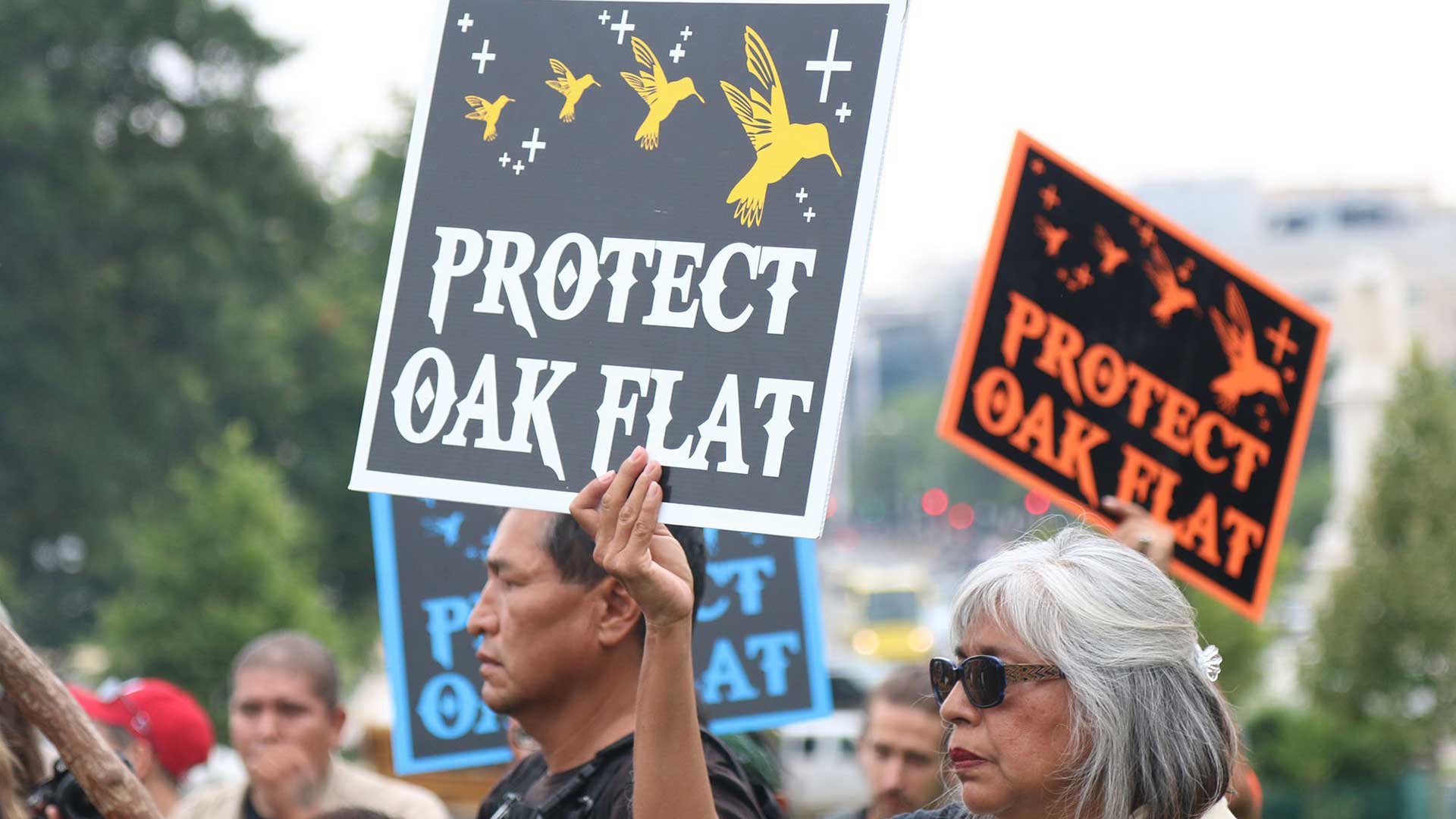 Protests against the Resolution Copper mine near Oak Flat have been going for years, as shown in this 2015 file photo from a rally at the Capitol.
Protests against the Resolution Copper mine near Oak Flat have been going for years, as shown in this 2015 file photo from a rally at the Capitol.
The Apache Stronghold, a Native grassroots organization, has asked a federal district court to temporarily block a controversial land swap between the U.S. government and Resolution Copper until the U.S. Supreme Court decides whether to take up a related appeal.
Oak Flat, located in the Tonto National Forest near Phoenix, is a sacred site for Western Apaches, including the San Carlos Apache Tribe. Tribal members use the area for religious and coming-of-age ceremonies, and they gather medicinal plants and acorns from its oak trees.
“Oak Flat is our spiritual lifeblood — the sacred place where generations of Apache have connected with our Creator,” Dr. Wendsler Nosie Sr., former chairman of the San Carlos Apache Tribe, said in April. “We are asking the courts to protect Oak Flat just as they have protected the sacred places of other faiths across the country.”
In 2014, Congress and President Barack Obama approved a national defense spending bill that included the Southeast Arizona Land Exchange Act. Backed by former Arizona Sen. John McCain, the measure authorized the transfer of federal land to the copper mining company in exchange for other parcels. Since then, the San Carlos Apache Tribe and its allies have fought to stop the transfer.
During oral arguments Wednesday, Apache Stronghold said the land exchange would result in an immediate loss of legal protections because Oak Flat would become private property.
“The moment the title transfers, the [final environmental impact statement] says that that becomes private property,” the group’s attorney said. “So there's an immediate loss of legal rights, which is an immediate harm.”
The nonprofit's argument relies on the Religious Freedom Restoration Act, which prohibits the government from substantially burdening religious practice without a compelling interest.
Apache Stronghold said the land transfer would allow Resolution Copper to restrict tribal access to areas outside the Oak Flat campground, even for religious ceremonies. Resolution Copper President Vicky Peacey testified that the company would not limit access to the campground for 10 years, but did not address access beyond that.
The group also argued that construction would begin immediately after the transfer, damaging sacred land and further limiting access.
“That construction itself ... can cause irreparable damage to the surface of Oak Flat,” an attorney said. “The only legal obligation on Resolution Copper, under the statute, is to preserve the Oak Flat campground — not the entirety of Oak Flat, just the campground. Even that legal obligation is conditional, temporary and at Resolution’s discretion.”
Peacey acknowledged during testimony that the land would eventually be “swallowed” by mining operations.
“But it is not immediate. Many years in the future,” she said.
The case escalated in April after the federal government signaled plans to move forward with the land transfer. A final environmental impact statement would trigger the conveyance as early as June 16.
Apache Stronghold’s attorney argued that the court should weigh the balance of harms.
“If you grant the injunction and the Supreme Court rules against us, the government loses nothing. The project goes forward. Every single ounce of copper, they can still recover,” the attorney said. “But if you deny relief, the transfer goes forward June 16, and then the Supreme Court decides, ‘Hey, we want to take a closer look at this,’ and rules in our favor — well, they've already built roads that can't be unbuilt. They've destroyed vegetation that can't be grown back. They've interfered with our religious practices that we can't get back again.”
U.S. District Judge Steven Logan, who previously declined to block the land swap in 2021, said he will issue a ruling by May 14.

By submitting your comments, you hereby give AZPM the right to post your comments and potentially use them in any other form of media operated by this institution.